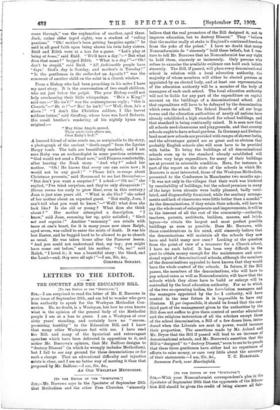[TO VIE EDITOR OP THE "SPECTATOR. " ] SIR,—Mr. Burrows says in
the Spectator of September 20th that Methodism and the other Free Churches " sincerely
believe that the real promoters of the Bill designed it, not to improve education, but to destroy Dissent." They "believe that the matter really at stake is England's continued freedom from the yoke of the priest." I have no doubt that many Nonconformists do " sincerely " hold these beliefs, but I yen.
ture to tell Mr. Burrows that no Nonconformist has any right to hold them, sincerely or insincerely. Only persons who refuse to examine the available evidence can hold such beliefs sincerely. The Bill, if passed, will place every denominational school in relation with a local education authority, the majority of whose members will either be elected persons or appointed by an elected body, and at least one representative of the education authority will be a member of the body of managers of each such school. The local education authority will not be liable for any part of the expenditure on capital account on the buildings of a denominational school. All that expenditure will have to be defrayed by the denomination which owns the school. The School Boards of all our large towns and the education authorities of nearly all nations have already established a high standard for school buildings, and that standard is being continually raised. It is seen now that all schools need classrooms and playgrounds, and that country schools ought to have school gardens. In Germany and Switzer- land most new schools are provided with ranges of shower-baths, and the advantages gained are so great and so obvious that probably English schools also will soon have to be provided with baths. To bring the buildings of all denominational schools even up to the standard already established will involve very large expenditure, for many of their buildings are at present in miserable condition. Here, for instance, is part of the report on the state of the schools in which Mr. Burrows is most interested, those of the Wesleyan Methodists, presented to the Conference in Manchester two mouths ago: " It was not only in the villages that their work was hindered by unsuitability of buildings, but the school premises in many of the large town circuits were badly planned, badly venti- lated, and disgracefully furnished, while the sanitary arrange- ments and lack of classrooms were little better than a scandal." As the denominations, if they retain their schools, will have to pay the whole cost of enlargements and improvements, it will be to the interest of all the rest of the community—authority, teachers, parents, architects, builders, masons, and brick. layers—to obtain the largest and most perfect possible buildings as soon as possible. Does Mr. Burrows, with these considerations in his mind, still sincerely believe that the denominations will maintain all the schools they now have and build many new ones ? Looking at the question from the point of view of a treasurer for a Church school, I have no such belief. It has been very difficult in the past to obtain money enough for the maintenance and occa- sional repair of denominational schools, although the members of the denominations appealed to have known that they would have the whole control of the schools. In future, if the Bill passes, the members of the denominations, who will have to pay school-rates as well as Nonconformists, will know that the schools which they alone have to build or enlarge will be controlled by the local education authority. For as to which of the two co-operating bodies, the foundation managers and the managers appointed by the loc. 1 authority, will have control in the near future it is impossible to have any illusions. If, per impossibile, it should be found that the one- third part of the management given to the authorities by the Bill does not suffice to give them control of secular education and the religious instruction of all the scholars except those of the school denomination, a Bill of a few dozen lines, intro- duced when the Liberals are next in power, would increase their proportion. The assertions made by Mr. Acla.nd and Mr. Bryce that the Bill if passed will lead to an increase of denominational schools, and Mr. Burrows's assertion that the Bill is "designed" to "destroy Dissent," seem to me to be proofs that these three gentlemen have, either had no experience of efforts to raise money, or care very little about the accuracy










































 Previous page
Previous page